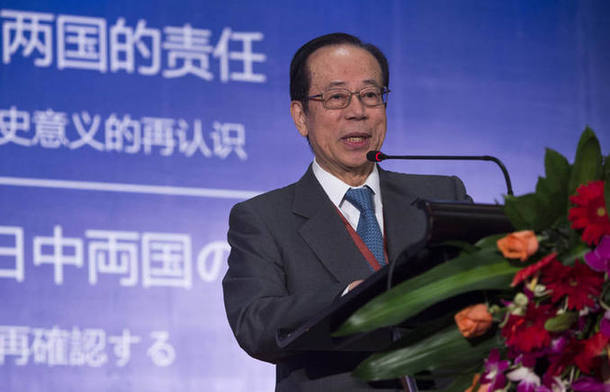The Fallacy about China’s Anti-Japan Sentiments
|
 |
|
Former Japanese Prime Minister Fukuda Yasuo speaks at the 9th Beijing-Tokyo Forum on October 27, 2013. He said that his country’s development depends on the whole international community. |
Last year, Philip Stephens, chief political commentator and associate editor of the Financial Times, penned the article “Abe Won’t Revive Japan by Rewriting History,” noting, “Mr. Abe is fanning the glowing embers of old rivalries and hatreds across east Asia... There is nothing to be gained, and much to be lost, by the attempt to rewrite the past.”
During his speech in Hiroshima last year, film director Oliver Stone said that Japan should learn from Germany in facing history – as the two were the main countries defeated in WWII. “In Germany we see a country that literally turned inward, examined itself and felt guilty about what had happened in the militarized war. Germany apologized, and more importantly, became a moral force in Europe for peace. When I look at Japan since WWII, I see culture, beauty, great movies, good cuisine, but not one politician, one PM who has stood up for peace, for moral integrity, not one... It is simply a satellite state, a client state of the United States.”
Germany reaffirms the truth that any country that is honest about its past, including unsavory parts, and has the guts to shoulder responsibilities accordingly, is destined to progress toward a better future. Japan should look to Germany, in order to reflect on itself and, following the European country’s example, to learn from history.
This overture is, however, rejected by certain people in Japan, whose arguments all boil down to the assertion that Japan and Germany are different countries, and drawing any comparison between them is hence inappropriate. This reminds many of the wide perception that Japan’s “common sense” is, in fact, rather a lack of international common sense. Is the whole international community going mad, or do those individuals oppose comparisons with Germany out of ulterior motives? There has been a broad consensus globally, rather than just a minority view, that Japan should follow Germany’s lead in dealing with the past. Compliance is not a tall order, and it is Japan itself that will benefit the most from this well-intended advice. As Confucius taught, when one sees a virtuous person, one should think of emulating him.
Amity is mutually beneficial, while enmity inflicts damage on both parties. Both the Chinese and Japanese people should learn from history. China is loath to see its relationship with Japan plunge to the lowest ebb since the establishment of full diplomatic ties between the two countries. The two sides should take action to restore good bilateral relations. The healthy and stable development of Sino-Japanese ties is in the interests of both peoples.
WANG TAIPING is former Chinese consul general in Osaka, Sapporo and Fukuoka.
